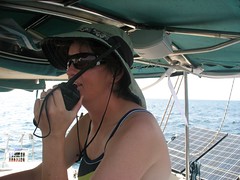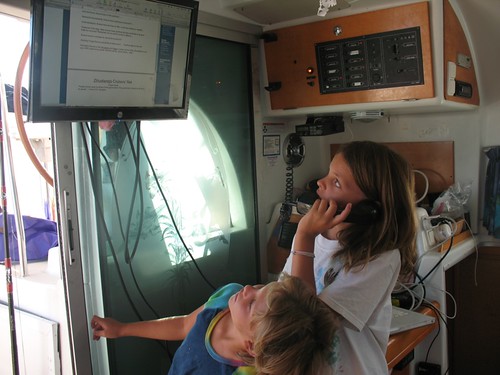Communication on the High Seas (Part I)
“You can get Internet in the middle of the Pacific? No way!?” – Typical reaction when I post from the ocean
Yes way. And at the same time, no... not really.
In a series of articles, I plan to discuss at length the various means that boats in general and Don Quixote in particular communicate with the rest of the world. We'll start this series with radios, in particular, the VHF.
Don Quixote is equipped with two forms of radio communication: VHF and SSB. VHF (Very High Frequency) radio is used for relatively short-range voice communication. It is used by local emergency services, for example, within a municipality. Essentially, VHF is good only for line of sight, though every once in awhile weather conditions will refract signal to our radio from up to 100 miles away.
We use the VHF primarily to communicate with our fellow cruisers and occasionally with naval authorities or other types of ocean travelers such as the big ass floating hotel about to run us down in the middle of the night. Somewhat illegally, we also use the VHF ship-to-shore with the hand held whenever we send crew off the boat and on to the dry. This leads me to a few recommendations for those preparing to cruise:
Security Measure – Do not stint on a good quality, high-powered VHF radio. If you can't tell someone your boat is sinking, you're going to be in a whole lot of water with nothing to hold on to and no one coming to your rescue.
Social Impact - The VHF is the cruiser party line. I don't mean beer and silliness, though there is some of that too. I'm suggesting that without a really good radio you will be completely cut off from the people who are your best resource for advice, assistance, and companionship.
Mirror to Helm - Make sure you can at least hear your VHF at the helm. If you can, put a radio at the helm as well as down below... and if you can only have one, the helm station is more important. When you are about to be run over by an asshat weekender, you don't want to release the helm to run below to yell at him over the VHF.
Handhelds - I recommend one or more handheld VHF radios. Walkie-talkies work, but they do not work nearly as well. I know that at $100 plus a pop, it may seem extravagant. I can't tell you, though, how many times we wished for more than the one we have. The scenario is mostly one of the family splitting up in town or on remote islands. DrC heads off to rummage for hardware, Toast to find the markets, the girls to locate ice cream and entertainment venues. Reliable communication is a boon in these situations.
Radio Protocol - Teach everyone on the boat to master the VHF. One afternoon up in Desolation Sound we listened helplessly over the VHF as the Canadian Coast Guard tried to talk sense into a woman whose husband was disabled – perhaps with a heart condition, hard to tell. It wasn't voyeurism, we literally had no choice. We were underway and so required to leave our radio on the dedicated marine channel... and she literally had no idea how to change channels. I didn't know whether to feel sorry for her or shake both her and her husband until their teeth rattled. She had no idea how to operate the boat or the radio, read the GPS, or describe her vessel. Don't do that to your crew. Even underage crew can become radio experts. Aeron was running net control down in Zihau at age 7.
Family Channel - However, this scenario of everyone in the crew with and on the radio leads to another tip, the family channel. The VHF spectrum in the nautical world consists of roughly 30 channels accessible for receive and transmit by most marine radios. Of those, no small fraction are dedicated to a specific, single purpose. For example, in virtually all U.S. waters Ch. 16 is used exclusively by nautical authorities and for ship-to-ship hails. A private yacht monitors Ch. 16 but rarely uses it except to signal intentions to nearby vessels and to hail authorities or other boats. On establishing contact with another boat, you must immediately switch channels. Authorities will direct you to another channel, but it's a good idea to have a number in mind in advance when calling your own crew. There are two reasons for this: First, getting both parties to actually hear a number on a busy channel can sometimes be surprisingly difficult. Second, you might not want the entire anchorage following you and your spouse as you switch channels to argue about what to have for dinner that night. The girls, in particular, attracted lurkers... benign, loving and friendly fellow cruisers who just enjoyed their piping voices and ridiculous requests as we'd head off to another channel to discuss whether or not they could have their third ice cream for the day. Agree in advance that the family always switches to 72 or 68 or ... pick your channel
. Program it into your radios as a favorite. Then when you hail family, just say, “Switch to the usual” and off you go. Pick a channel way up there out of the way of most local traffic.
* * *
One of our greatest pleasures in Mexico was watching the kids – ours and those from other boats – blossom into radio experts. VHF protocol teaches us all how to respect and listen, choose our words carefully, and communicate clearly and precisely. Use your radio as a teaching tool and trust that you'll never regret spending the extra money on this particular piece of equipment.
Yes way. And at the same time, no... not really.
In a series of articles, I plan to discuss at length the various means that boats in general and Don Quixote in particular communicate with the rest of the world. We'll start this series with radios, in particular, the VHF.
Don Quixote is equipped with two forms of radio communication: VHF and SSB. VHF (Very High Frequency) radio is used for relatively short-range voice communication. It is used by local emergency services, for example, within a municipality. Essentially, VHF is good only for line of sight, though every once in awhile weather conditions will refract signal to our radio from up to 100 miles away.
We use the VHF primarily to communicate with our fellow cruisers and occasionally with naval authorities or other types of ocean travelers such as the big ass floating hotel about to run us down in the middle of the night. Somewhat illegally, we also use the VHF ship-to-shore with the hand held whenever we send crew off the boat and on to the dry. This leads me to a few recommendations for those preparing to cruise:
Security Measure – Do not stint on a good quality, high-powered VHF radio. If you can't tell someone your boat is sinking, you're going to be in a whole lot of water with nothing to hold on to and no one coming to your rescue.
Social Impact - The VHF is the cruiser party line. I don't mean beer and silliness, though there is some of that too. I'm suggesting that without a really good radio you will be completely cut off from the people who are your best resource for advice, assistance, and companionship.
Mirror to Helm - Make sure you can at least hear your VHF at the helm. If you can, put a radio at the helm as well as down below... and if you can only have one, the helm station is more important. When you are about to be run over by an asshat weekender, you don't want to release the helm to run below to yell at him over the VHF.
Handhelds - I recommend one or more handheld VHF radios. Walkie-talkies work, but they do not work nearly as well. I know that at $100 plus a pop, it may seem extravagant. I can't tell you, though, how many times we wished for more than the one we have. The scenario is mostly one of the family splitting up in town or on remote islands. DrC heads off to rummage for hardware, Toast to find the markets, the girls to locate ice cream and entertainment venues. Reliable communication is a boon in these situations.
Radio Protocol - Teach everyone on the boat to master the VHF. One afternoon up in Desolation Sound we listened helplessly over the VHF as the Canadian Coast Guard tried to talk sense into a woman whose husband was disabled – perhaps with a heart condition, hard to tell. It wasn't voyeurism, we literally had no choice. We were underway and so required to leave our radio on the dedicated marine channel... and she literally had no idea how to change channels. I didn't know whether to feel sorry for her or shake both her and her husband until their teeth rattled. She had no idea how to operate the boat or the radio, read the GPS, or describe her vessel. Don't do that to your crew. Even underage crew can become radio experts. Aeron was running net control down in Zihau at age 7.
Family Channel - However, this scenario of everyone in the crew with and on the radio leads to another tip, the family channel. The VHF spectrum in the nautical world consists of roughly 30 channels accessible for receive and transmit by most marine radios. Of those, no small fraction are dedicated to a specific, single purpose. For example, in virtually all U.S. waters Ch. 16 is used exclusively by nautical authorities and for ship-to-ship hails. A private yacht monitors Ch. 16 but rarely uses it except to signal intentions to nearby vessels and to hail authorities or other boats. On establishing contact with another boat, you must immediately switch channels. Authorities will direct you to another channel, but it's a good idea to have a number in mind in advance when calling your own crew. There are two reasons for this: First, getting both parties to actually hear a number on a busy channel can sometimes be surprisingly difficult. Second, you might not want the entire anchorage following you and your spouse as you switch channels to argue about what to have for dinner that night. The girls, in particular, attracted lurkers... benign, loving and friendly fellow cruisers who just enjoyed their piping voices and ridiculous requests as we'd head off to another channel to discuss whether or not they could have their third ice cream for the day. Agree in advance that the family always switches to 72 or 68 or ... pick your channel
* * *
One of our greatest pleasures in Mexico was watching the kids – ours and those from other boats – blossom into radio experts. VHF protocol teaches us all how to respect and listen, choose our words carefully, and communicate clearly and precisely. Use your radio as a teaching tool and trust that you'll never regret spending the extra money on this particular piece of equipment.

